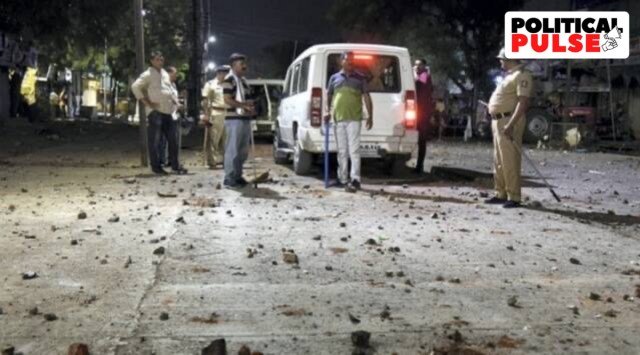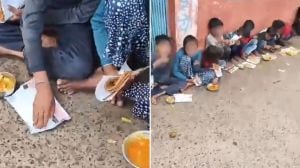Key front in 2024 battle, Maharashtra sees spurt in communal incidents
A panel to check interfaith marriages, Jan Aakrosh Morcha rallies, Ram Navami violence, violence in Akola, Ahmednagar -- Opp accuses BJP of trying to polarise
 On May 13, communal violence rocked Akola district in the Vidarbha region after, according to the police, a youth shared an objectionable post on Instagram that angered a community (Express)
On May 13, communal violence rocked Akola district in the Vidarbha region after, according to the police, a youth shared an objectionable post on Instagram that angered a community (Express) A crucial battleground in the scheme of national politics as the country heads towards general elections next year, Maharashtra has witnessed quite a few communal incidents and provocations since last year.
In April 2022, Independent MP Navneet Kaur and Independent MLA Ravi Rana, her husband, triggered a row when they threatened to recite the Hanuman Chalisa outside the home of then Chief Minister Uddhav Thackeray. The threat by the Ranas came after Maharashtra Navnirman Sena Sena (MNS) chief Raj Thackeray gave the Uddhav government an ultimatum to bring down loudspeakers at mosques.
Later in the year, in December, the decision of the Maharashtra government — by then, led by Eknath Shinde and his group of Shiv Sena rebels and the BJP — to constitute a panel to track interfaith and intercaste couples triggered another row, with some alleging it was setting the ground for a future bid to introduce an anti-religious conversion Bill.
Starting in November, the state saw Hindu Jan Aakrosh Morcha rallies being held across the state. Between then and March this year, at least 50 such rallies were organised in almost all of the state’s 36 districts. Each of these events followed a pattern. A a brief march through the heart of a city by people saffron flags and caps, followed by a short rally, where speakers on a makeshift dais attacked minorities and invoked “love jihad”, “land jihad”, “forced conversions”, and issued calls for the economic boycott of Muslims. While the BJP distanced itself from these rallies, saying they were being organised by the Sakal Hindu Samaj, an umbrella body of Hindutva and Sangh organisations, almost all these events had the presence of party leaders, including local BJP MLAs and MPs.
In March, several parts of India saw communal clashes break out during Ram Navami and Maharashtra was also no exception. There were reports of violence from Jalgaon in which four people were injured. The following day, two groups of youths clashed in the Kiradpur area of Aurangabad and arson and stone pelting occurred. One person succumbed to bullet injuries and 14 police officials, including five officers, were injured in the violence. In Mumbai’s Malvani area, stone pelting occurred when two groups clashed during a procession.
There have been two communally charged incidents this month itself. On May 13, communal violence rocked Akola district in the Vidarbha region after, according to the police, a youth shared an objectionable post on Instagram that angered a community. One person was killed and eight were injured after the violence broke out.
The same day as Akola was in the grip of violence, about 440 km away an incident at the Trimbakeshwar temple in Nashik triggered a controversy. A group of people, purportedly belonging to a religious minority community, allegedly tried to enter the temple and offer a chadar. Deputy Chief Minister Devendra Fadnavis on Tuesday announced that a special investigation team (SIT) would probe the alleged incident, but Muslim community leaders expressed surprise at the government’s move, saying local Muslims for decades had been practising a ritual of showing loban or frankincense from the temple entrance steps. They denied any attempt to enter the temple or place any chadar, saying local Hindus had never taken exception to the practice.
As Vishwa Hindu Parishad (VHP) activists carried out “shuddhikaran (purification)” of the temple and washed its steps with milk and water, Maulana Azad Vichar Manch president Hussain Dalwai expressed shock. “Are we living in a progressive Maharashtra? This was a state that initiated sweeping social reforms in the past. This was a state that took pride in communal harmony. Unfortunately, even traditions in existence displaying Hindu-Muslim unity are being distorted to suit narrow and partisan politics. In villages across the state, there are instances where Hindus and Muslims treat mosques and temples with sanctity and participate,” he said.
Hitting out at the BJP, Shiv Sena (Uddhav Balasaheb Thackeray) MP Sanjay Raut said, “It is the BJP’s strategy to divide people in the name of religion and Hindutva. They have to revert to such divisive politics as they can clearly sense the ground slipping under its feet.”
Nationalist Congress Party (NCP) leader Jitendra Awhad said, “The BJP’s agenda is to create communal divide and hatred politics.”
In response to the Opposition leaders’ statements, a senior BJP functionary stuck to his guns. “From Ram Janmabhoomi to Trimbakeshwar temple, we have done nothing wrong. Why shouldn’t we protest and fight for our rights and ownership of places of faith revered by Hindus?”
The communal incidents and violence come against the backdrop of the BJP and Shinde Shiva Sena battling it out with the Uddhav Thackeray-led Sena over the tag of “the true representative of Hindutva” in the state. Nearly a year since the split and despite the Election Commission ruling in its favour as the real Sena, Shinde has not been able to prise away the party’s cadre from the Uddhav faction.
Photos



- 01
- 02
- 03
- 04
- 05




























